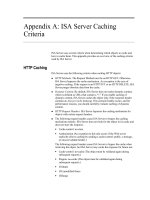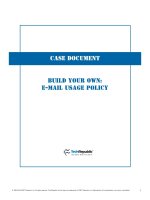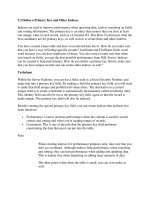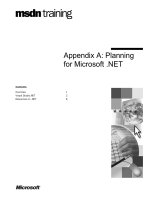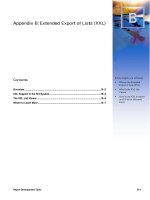Tài liệu Appendix A: Designing an Acceptable Use Policy docx
Bạn đang xem bản rút gọn của tài liệu. Xem và tải ngay bản đầy đủ của tài liệu tại đây (1.46 MB, 14 trang )
Contents
Overview 1
Lesson: Analyzing Risks That Users
Introduce 2
Lesson: Designing Security for Computer
Use 6
Appendix A: Designing
an Acceptable Use
Policy
Information in this document, including URL and other Internet Web site references, is subject to
change without notice. Unless otherwise noted, the example companies, organizations, products,
domain names, e-mail addresses, logos, people, places, and events depicted herein are fictitious,
and no association with any real company, organization, product, domain name, e-mail address,
logo, person, place or event is intended or should be inferred. Complying with all applicable
copyright laws is the responsibility of the user. Without limiting the rights under copyright, no
part of this document may be reproduced, stored in or introduced into a retrieval system, or
transmitted in any form or by any means (electronic, mechanical, photocopying, recording, or
otherwise), or for any purpose, without the express written permission of Microsoft Corporation.
Microsoft may have patents, patent applications, trademarks, copyrights, or other intellectual
property rights covering subject matter in this document. Except as expressly provided in any
written license agreement from Microsoft, the furnishing of this document does not give you any
license to these patents, trademarks, copyrights, or other intellectual property.
2002 Microsoft Corporation. All rights reserved.
Microsoft, MS-DOS, Windows, Windows NT, Active Directory, ActiveX, BizTalk, PowerPoint, Visio,
and Windows Media
are either registered trademarks or trademarks of Microsoft Corporation in the
United States and/or other countries.
The names of actual companies and products mentioned herein may be the trademarks of their
respective owners.
Appendix A: Designing an Acceptable Use Policy 1
Overview
*****************************
ILLEGAL FOR NON
-
TRAINER USE
******************************
This appendix presents information about determining threats and analyzing
risks that users can introduce to a network. You will learn how to define what is
considered to be an acceptable use of computers, accounts, Internet access,
applications, and the network.
After completing this appendix, you will be able to:
!
Analyze risks that users introduce.
!
Design security for computer use.
Introduction
Ob
j
ectives
2 Appendix A: Designing an Acceptable Use Policy
Lesson: Analyzing Risks That Users Introduce
*****************************
ILLEGAL FOR NON
-
TRAINER USE
******************************
Every organization must decide what is acceptable behavior for users and
computers. Lax acceptable use policies may leave the organization vulnerable
to attack. However, policies that are overly restrictive may inhibit business
practices and may be subverted or ignored by employees.
After completing this lesson, you will be able to:
!
Describe an acceptable use policy.
!
Explain why an acceptable use policy is important.
!
List common vulnerabilities that users introduce through behavior.
Introduction
Lesson objectives
Appendix A: Designing an Acceptable Use Policy 3
What Is an Acceptable Use Policy?
*****************************
ILLEGAL FOR NON
-
TRAINER USE
******************************
Acceptable use policies are administrative policies designed to regulate how
users use computers and network resources.
Acceptable use policies are often created for situations where technical policy
implementations:
!
Are not possible. For example, your organization may create an acceptable
use policy that prohibits users from discussing legal affairs of the company
in public areas in order to prevent information from being overheard by
eavesdroppers.
!
Are not cost effective. For example, you organization may have a policy that
restricts Web browsing to only approved sites, but the software application
required to restrict Web browsing may be too expensive to purchase and
implement.
!
Violate a user’s right to privacy. For example, your organization may want
to create a security policy that audits user passwords to ensure that they are
not easily guessable, but doing so would violate privacy laws.
Key points
4 Appendix A: Designing an Acceptable Use Policy
Why an Acceptable Use Policy Is Important
*****************************
ILLEGAL FOR NON
-
TRAINER USE
******************************
A user leaves her company-issued portable computer unattended at home while
connected to the corporate network by using a virtual private network (VPN)
tunnel. Her child approaches the keyboard and deletes critical files from the
corporate network, resulting in data loss.
An employee installs an application on his computer that is not permitted by
company policy. The application has known vulnerabilities, which an attacker
exploits to gain control of the computer. The attacker uses the computer to
attack the network.
External attacker
scenario
Internal attacker
scenario
Appendix A: Designing an Acceptable Use Policy 5
Common Vulnerabilities That Users Introduce
*****************************
ILLEGAL FOR NON
-
TRAINER USE
******************************
Many networks must endure malicious or disgruntled users who will attempt to
intentionally subvert network security. However, most of the security threats
that users introduce to networks are a result of:
!
A lack of training. For example, a user may not know the difference
between passwords that are easy for attackers to guess and those that are
difficult to guess.
!
Failure to provide due care. For example, a user may leave his portable
computer in his automobile while parking in a public parking lot.
!
Misuse of network resources. For example, a computer is exposed to a virus
when a user downloads an unsigned Microsoft
®
ActiveX
®
component from
a malicious Web site that promises access to pirated software.
Key points
6 Appendix A: Designing an Acceptable Use Policy
Lesson: Designing Security for Computer Use
*****************************
ILLEGAL FOR NON
-
TRAINER USE
******************************
An acceptable use policy encompasses computers as well as applications,
network resources, and access to the Internet. The limits that you place on user
behavior must be appropriate, realistic, and enforceable. You must also ensure
that your users are aware of the rules that you create.
After completing this lesson, you will be able to:
!
List the steps for designing an acceptable use policy.
!
Explain guidelines for acceptable use of users, computers, applications,
networks, and the Internet.
Introduction
Lesson objectives
Appendix A: Designing an Acceptable Use Policy 7
Steps for Designing an Acceptable Use Policy
*****************************
ILLEGAL FOR NON
-
TRAINER USE
******************************
To design an acceptable use policy, follow these steps:
1. Identify vulnerabilities to the network that users introduce. Predict threats
and vulnerabilities that users might introduce to network resources.
2. Determine how much access to technology resources you want to grant
users. To ensure that users have the least privilege to network resources
that is necessary for them to complete their job duties, determine the
minimum level of access to resources that job roles require.
3. Create clear and concise acceptable use policies. Based on the information
gained from completing the first two steps, create clear and concise
acceptable use policies that are plainly written and easy for users to follow.
4. Gather feedback from managers and human resource and legal
departments on proposed policies. To ensure that the acceptable use
policies are appropriate, enforceable, and do not violate employee rights,
ensure that management, human resource, and legal departments review
and approve acceptable use policies.
5. Gather feedback from employees about policies. To ensure that acceptable
use policies do not disrupt business processes, and to obtain backing from
employees, gather feedback on proposed policies.
6. Revise policies based on feedback and create detailed procedures before
implementing the policies. After incorporating the feedback from all
stakeholders, work with human resources to create and implement
acceptable use policies.
Key points
8 Appendix A: Designing an Acceptable Use Policy
Guidelines for Acceptable Use for Users
*****************************
ILLEGAL FOR NON
-
TRAINER USE
******************************
Two important acceptable use policies for users pertain to how users:
!
Manage information. To protect confidential information from exposure,
create guidelines for managing these categories of information. You may
need to further categorize information to create these guidelines. For
example, you may want to create separate guidelines for legal information
and human resources information, even though both have been categorized
as confidential.
!
Use accounts. To prevent accounts from being easily compromised by
attackers, create acceptable use policies that determine how to use accounts
and how to create and managed passwords. Because you must trust that
users handle their user accounts with due care, create training and guidance
for users on how to comply with the acceptable use policies.
Key points
Appendix A: Designing an Acceptable Use Policy 9
Guidelines for Acceptable Use of Computers and Applications
*****************************
ILLEGAL FOR NON
-
TRAINER USE
******************************
To prevent computers from unnecessary exposure to attackers, create
acceptable use policies based on the guidelines in the preceding slide.
You can use Software Restriction policies in Microsoft Windows
®
XP to
restrict which applications are permitted to run.
Key points
Note
10 Appendix A: Designing an Acceptable Use Policy
How to Define Acceptable Use of a Network
*****************************
ILLEGAL FOR NON
-
TRAINER USE
******************************
To ensure that users do not expose resources on the network to attackers,
include guidelines in your acceptable use policy for:
1. Computers that can access the network. A user may connect her home
computer to the network to steal company software.
2. Rules that determine user access to internal resources. A user may abuse
access to internal resources, such as color laser printers.
3. Methods and restrictions to storing data. A user may use a network share to
store illegally obtained music files and then share them to users on the
Internet by using peer-to-peer file sharing protocols.
4. Use of remote access. A user may use a remote access connection to the
organization to view illicit content on the Internet.
Key points
Appendix A: Designing an Acceptable Use Policy 11
How to Define Acceptable Use of Internet Access
*****************************
ILLEGAL FOR NON
-
TRAINER USE
******************************
Because the Internet is an untrusted network, applications that connect to the
Internet can provide direct access for attackers to your internal network.
To enforce acceptable use policies regarding Internet use, you can often
combine the policies with implementations of technical policies, such as
firewall rules and software that screens Web content.
Key points
12 Appendix A: Designing an Acceptable Use Policy
Security Policy Checklist
*****************************
ILLEGAL FOR NON
-
TRAINER USE
******************************
Use the following checklist to guide your security design for acceptable use.
Phase Task Details
Planning Model threats STRIDE (spoofing, tampering, repudiation,
information disclosure, denial of service and
elevation of privilege) and life cycle threat
models
Manage risks Qualitative and quantitative risk analysis
Phase Task Details
Building Create policies and
procedures for
acceptable use of:
Computers and applications
Access to the network
Internal network applications and resources
Internet applications and resources
Checklist

